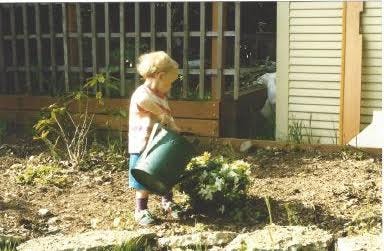HENRY'S DRESS SHOES
“At school, bare feet weren't allowed, so Henry took to wearing the ugliest, most worn-out, abused and tattered sandals.”
When Henry was 16 and decided to give up eating meat, his wrestling coach told him he'd be healthier if he didn’t. "Sure, but how healthy would the cow be?" Henry said. He was reckless and bold and contrarian, extremely intelligent but not likely to let you know it. One day he discovered he could draw well; the next day, he refused to draw at all. In track he was a distance runner, but when people started complimenting him, he slowed down. He was a lot of fun and truly exasperating and determined to march to his own drumbeat. In his case, that meant marching barefoot.
It started in high school. He walked shoeless on Oregon pavement so hot it gave him blisters. He walked in snow with his feet protected only by plastic bags. My husband and I rolled our eyes and stayed silent; teens need to explore boundaries and test their resolve, and this was not a battle we felt compelled to win. Henry wasn’t one to explain why he did the things he did, but I know he loved the connection with the earth that came with being barefoot. He was a nature kid at his core. He once picked a four-leaf clover with his toes.
At school, bare feet weren’t allowed, so Henry took to wearing what we called his “dress shoes”: the ugliest, most worn-out, abused and tattered sandals. They became his daily footwear. He wore them in his senior photos, to awards ceremonies and graduation. He finally, joyfully, ditched them when he went off shoeless to Humboldt State University and the redwoods of California. Barefoot on campus in rain, in fog, in sun, he was easily recognizable; his nickname was Earthwalker. We watched a video of him climbing a sequoia and shuddered to see the soles of his feet digging into the coarse bark.
One Tuesday morning in November 2015, when he was 19, Henry was found dead on a ropes course in the redwood forest. He was wearing sneakers. We asked his friends and roommates why. Not why had he died—they surely wouldn't know—but why was he wearing shoes? It was cold that morning, a little bit icy, according to the sheriff who walked us through the task of claiming Henry’s body and his belongings. We wondered if the shoes had caused him to slip and fall on the ropes course, leaving him fatally tangled in the ropes but with his feet still on the ground.
The unknowns of his dying were difficult for me for a long time, but now I don't care about how he died, only how he lived.
Henry's friends helped us box up his things and told us stories of our quirky son who stole potatoes from the cafeteria and tried to plant them among the giant trees, who wanted to study fungi, who could name every flower in the area. All of it sounded exactly like Henry. He’d been a botanist from a very young age, taking apart plants and learning to identify them by seed, leaf and stem. He used to lay them in arrays on the front walkway. I miss those arrays.
In the last nine years, I have been wearing Henry's shirts. My husband wears his tennis shoes. It's nice to be of similar sizes and able to hold him close to our bodies. But his dress shoes—these ratty, gray, smelly sandals—will never be worn or used. They will remain a beautiful family joke, a bittersweet symbol of Henry’s stubbornness and his need to be an individual no matter what. I will never not smile when I look at them and think lovingly of my only boy, who died too young, too suddenly, 300 miles away, alone among the tallest of all trees and wearing unfamiliar shoes.
—Eileen Nittler
Eileen Nittler writes and explores every day and has been published in redrosethorns, Oregon Humanities and Oyster River Pages. She recently moved from Oregon to Montana to be close to her surviving daughter.
For a different reading experience, The Keepthings’ stories can also be read in their entirety on Instagram @TheKeepthings.
Have a story to share? Please see the complete submission guidelines, including photo guidelines, at TheKeepthings.com.







This is beautifully conceived and written. Focusing on the objects that our people leave behind and all the ways they allow us to remember and appreciate a life well lived is a powerful way to bring readers into such a brutal loss. Thank you for writing, editing and sharing Henry’s shoes and the mysteries of his extraordinary life. Our deepest fears of losing a child newly separated from us make us want to turn away from stories like this. But parents who lose children hold some of the greatest wisdom there is, and deserve both our attention and our reverence. Thank you. I will not forget Henry’s shoes.
Henry was a special young man, chosen by greatness to feel Mother Earth through his soles and his soul.
What a fabulous write, momma. I’m glad you and your hubby still wear his things, as I do with my sons things. It brings us a moments joy in the morning as we don the clothing item and gives us cause to remember the good times, when we reach down to the hem of the shirt and rub it between our thumb and pointer finger.
Thank you for sharing your Henry with us and keeping him alive through your words. I hope to someday be as brave as you, sharing my son in story. He was 21 when he left this earth to an asthma attack and it still feels like yesterday as I relive the trauma daily.